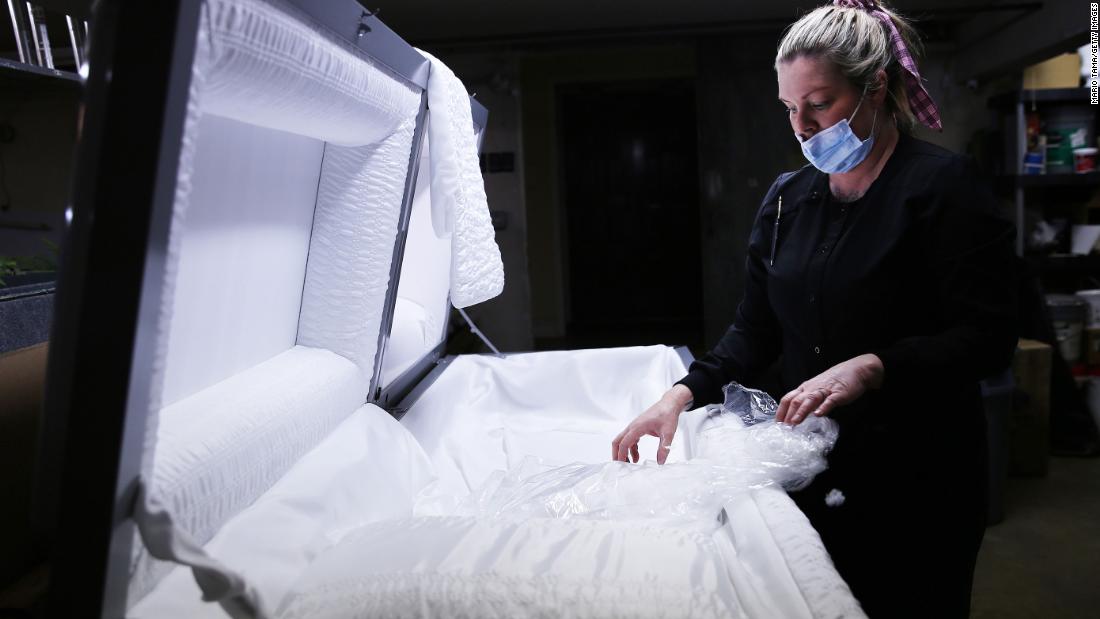The gloomy milestone supports the growing demand from state officials for more vaccines so that Americans can be vaccinated more quickly.
On Tuesday, President Joe Biden’s Covid coordinator, Jeff Zients, informed governors that allocations would increase by about 16% from next week, according to a source with knowledge of the call.
Biden pushed for 100 million vaccines in the first 100 days of his presidency, but with a long way to go for vaccinations, he also called for 100 days of mask use.
With these additional doses, Biden said there would be enough to fully vaccinate 300 million Americans – almost the entire population of the United States – by the end of summer or early fall.
Vaccine supply does not meet demand
Struggling after the stress of nearly a year responding to the pandemic, states are eager to administer vaccines quickly and attempt a return to normal life.
“We have to defeat it because the Mississipians are gone. We have finished burying loved ones who have been lost to this virus. We have ended with stressed hospitals. We have ended the fearful talk of closings and closings. We are ready for the community again,” said the governor from Mississippi, Tate Reeves, who announced that the state has celebrated nearly 200,000 vaccines delivered.
The director of Maine’s Center for Disease Control and Prevention said he was “very excited” about the new presidential administration’s approach to vaccines, but that the state is still struggling with vaccine shortages.
“We know that now the number of individuals who want to be vaccinated far outweighs the vaccine supply we have available,” said Dr. Nirav Shah.
Colorado Governor Jared Polis said his talks with the Biden government have made him hopeful about the future of vaccine distribution, but that “we still can’t count on an additional supply”.
Even if the government delivers on the promised 16% increase in allocations, New York Governor Andrew Cuomo told MSNBC’s Nicolle Wallace that it won’t be enough.
“We are functionally out, we will start getting a new allocation in the next few days,” said Cuomo.
Variants fuel demand and fears
Increasing public fears is the spread of coronavirus variants.
On Tuesday, Kentucky Governor Andy Beshear announced that two cases of the variant first identified in the UK had been confirmed in the state.
The threat of variants has made the state’s reopening a major concern in California, a recent epicenter of the U.S. pandemic, said Los Angeles County Public Health Director Barbara Ferrer.
“This would not be the time to think just because we are reopening that things are getting better,” she said, noting that asymptomatic spread is a problem. “We need to move forward in the coming weeks with caution. On many other points where we are reopening our sectors, we have actually seen an increase in our cases and we cannot afford to pay for it.”
In turn, Pfizer CEO Albert Bourla tried to defuse fears surrounding the variants by ensuring that the foundations are already being laid to combat them.
“We shouldn’t be afraid, but I think we need to be prepared,” said Bourla during the Bloomberg The Year Ahead event on Tuesday. “As soon as we discover something that is not so effective, we will produce a very, very quickly booster dose that will be a small variation from the current one.”
Security at school reopening
Meanwhile, there was a glimpse of good news on Tuesday for parents who wish to return their children to school.
A CDC report said that with the right mitigation strategies, it is possible to open K-12 schools for in-person learning with minimal Covid-19 transmission.
These mitigation strategies include the use of masks, social distance and time limitation in shared external spaces, according to the study of the CDC’s Weekly Morbidity and Mortality Report.
In Ohio, Governor Mike DeWine said he wants anyone who works at a school to receive their first dose of vaccine in February at least, hoping to send all students back to school by March 1.
Currently, people over 75 and those with certain medical conditions can receive vaccines. On February 1, those 70 and older and staff at K-12 schools will be eligible for the vaccine, he said during a news conference on Tuesday.
The reopening of schools has been a priority for many authorities, as students across the country have spent months learning remotely. But local leaders approached the return in several ways.
Of the 20 largest school districts in the country, nine are all online, eight offer the option of face-to-face or fully online, two have a hybrid plan and one in Hawaii varies plans based on infection rates across different islands.
CNN’s Amanda Watts, Virginia Langmaid, Mj Lee, Sara Murray, Jamiel Lynch, Anna Sturla, Keith Allen, Mirna Alsharif, Taylor Romine, Elizabeth Cohen, Rebekah Riess, Stella Chan, Amanda Sealy, Jennifer Henderson and Lauren Mascarenhas contributed to this report .
